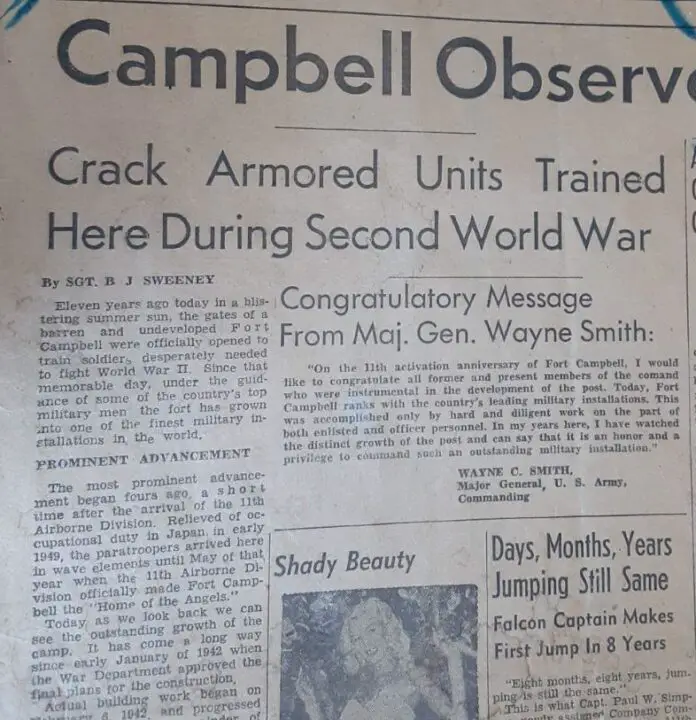Before He Was a Restauranteer He Was a Writer!
While everyone in Monmouth County thinks of The Shore Casino in the Atlantic Highlands Yacht Harbor when they hear the name Bernie Sweeney, it was different 75 years ago. That’s when the Jersey City native was in the army and stationed at Camp Campbell in Kentucky. He was also a writer in the service, as he was before his Casino In The Park days in Jersey City.
So it was in 1953 on the 11th anniversary of the official opening of the camp for training soldiers, that Sweeney wrote a front page, by-lined article for The Courier, in its anniversary edition of the weekly newspaper for the Campbell area.
The paper recently stopped circulation now in search of the most efficient means of circulating the news for military on the base, located on the Kentucky-Tennessee border between the towns of Hopkinsville in Kentucky and Clarksville in Tennessee. The base is named for Army Brigadier General William Bowen Campbell, a general in the Union army during the Civil War and the last Whig Governor of the state of Tennessee.
Fort Campbell is the home of the 101st Air borne Division and the 160th Special Operations Aviation Regiment. Sweeney’s several thousand-word story spanned three pages of the newspaper back in 1953, highlighting the arrival of the base created to train soldiers during World War II .
It began when the 11th Airborne Division arrived after being relieved of occupational duty in Japan in 1949. The paratroopers, Sweeney said, “arrived here in wave elements until May of that year when the 11th Airborne Division officially made Fort Campbell the Home of the Angels.”
Sweeney traced the construction that continued on the base from 1942 when the area was struck by heavy rains, minor floods and the need to prepare the camp for an early occupancy to meet the needs of war training.
Sweeney’s story also told of the circumstances surrounding which state could claim ownership to the Home of the Angels, first identified as Tennessee based on surveyors indicating that two-thirds of the reservation was south of the state line. Later, because of complaints about it, the matter was studied further in Washington, the reporter continued, and “the camp was officially changed from Camp Campbell, Tennessee, to Camp Campbell, Kentucky.
Eight years later, when the camp was redesignated from a temporary to a permanent post, it was renamed Fort Cambell, Kentucky.
The base was also a prison camp for the many German prisoners of war who were housed there during World War II, with three stockades used for that purpose, each holding 3,000 men, and separating the captured Nazi from anti-Nazi prisoners.
In later years, the base was expanded and at the time Sweeney was stationed there, it included new housing, a gym, theater, permanent barracks, a hospital, and military and recreational facilities that ranked the base among the best in the world. There was also a 25-classroom school built for military children and a modern-day hospital with specialties in neurosurgery, plastic and orthopedic surgery and other specialized treatment for veterans returning from the Korea war shortly after 1950.
Today, while it is on hold while installation leadership explores options for the best platform to continue serving the Fort Campbell community’s information needs, the newspaper’s leaders praise the “award-winning team” ore reporters and editors who “wove words into narratives, capturing the essence of Army life with the hope that in the future “it may find its new path and keep weaving stories for generations to come!”
Bernie Sweeney Bernie Sweeney BernieBernie Sweeney Sweeney Bernie Sweeney
Bernie Sweeney Bernie Sweeney
Bernie Sweeney



